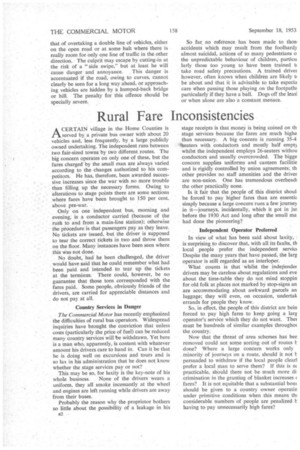Rural Fare Inconsistencies
Page 36

If you've noticed an error in this article please click here to report it so we can fix it.
ACERTAIN village in the Home Counties is served by a private bus owner with about 20 vehicles and, less frequently, by a large publicly owned undertaking. The independent runs between two fair-sized towns• by two different routes. The big concern operates on only one of these, but the fares charged by the small man are always varied according to the changes authorized to his competitors. He has, therefore, been awarded successive increases since the war with no more trouble than filling up the necessary forms. Owing to alterations to stage points there are some sections where fares have been brought to 150 per cent. above pre-war.
Only on one 'independent bus, morning and evening, is a conductor carried (because of the rush to and from a main-line station); otherwise the procedure is that passengers pay as they leave. No tickets are issued, but the driver is supposed to tear the correct tickets in two and throw them on the floor. Many instances have been seen where this Was not done.
No doubt, had he been challenged, the driver would have said that he could remember what had been paid and intended to tear up the tickets at the terminus. There could, however, be no guarantee that those torn corresponded with the fares paid. Some people, obviously friends of the drivers, are carried for appreciable distances and do not pay at all.
Country Services in Danger The Commercial Motor has recently emphasized the difficulties of rural bus operators. Widespread inquiries have brought the conviction that unless costs (particularly the price of fuel) can be reduced many country services will be withdrawn. Yet here is a man who, apparently, is content with whatever amount his drivers, care to hand in. Can it be that he is doing well on excursions and tours and is so lax in his administration that he does not know whether the stage services pay or not?
This may be so, for laxity is the key-note of his whole business. None of the drivers wears a uniform, they all smoke incessantly at the wheel and engines are left running while drivers are away from their buses.
Probably the reason why the proprietor bothers so little about the possibility of a leakage in his B2 stage receipts is that money is being coined on th stage services because the fares are much highe than necessary. A big concern is running 35-4 *seaters with conductors and mostly half empty whilst the independent employs 26-seaters withou conductors and usually overcrowded. The bigge concern supplies uniforms and canteen facilitie and is rigidly controlled by union agreements: th other provides no staff amenities and the driver are non-union. One has tremendous overheadh the other practically none.
Is it fair that the people of this district shod be forced to pay higher fares than are essenti2 simply because a large concern runs a few journey in it—journeys, incidentally, which it got in jui before the 1930 Act and long after the small ma had done the pioneering?
Independent Operator Preferred In view of what has been said about laxity, . is surprising to discover that, with all its faults, th local people prefer the independent servicc Despite the many years that have passed, the larg operator is still regarded as an interloper.
What counts is that Whilst the indePender drivers may be careless about regulations and eve about the time-table they do not ,mind stoppin for old folk at places not marked by stop-signs an are accommodating about awkward parcels an luggage; they will even, on occasion, undertak errands for people they know.
So, in effect, the people of this district are bein forced to pay high fares to keep going a larg operator's service which they do not want. Thei must be hundreds of similar examples throughot the country.
Now that the threat of area schemes has bee removed could not some sorting out of routes t done? Where a large concern works only minority of journeys on a route, should it not t persuaded to withdraw if the local people clearl prefer a local man to serve them? If this is ric practicable. should there not be much more di; crimination in the granting of blanket increases c fares? It is not equitable that a substantial born should be given to a country owner operatin under primitive conditions when this means th4 considerable numbers of people are penalized having to pay unnecessarily high fares?




































































































